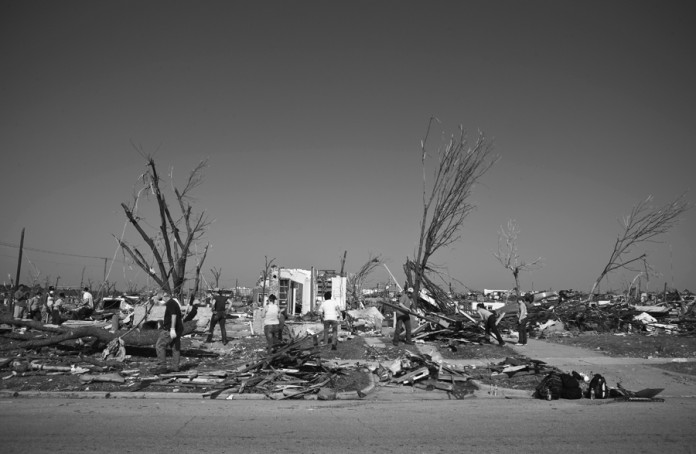Julian Moore
National Beat Reporter
After a string of disastrous tornadoes ripped through their home state this week, Oklahoma Sens. Tom Coburn (R-OK) and Jim Inhofe (R-OK) have requested federal funds to assist with disaster relief. But just a few months ago, both Oklahoma legislators worked to deny the same federal relief to states affected by Hurricane Sandy. Both senators have defended their requests by categorizing their states’ needs as necessary spending, but the position has left them and other proponents of relief fund reduction in an awkward political position.
But the two senators are among a growing list of opponents to federal relief aid who have requested help from the Federal Emergency Management Agency (FEMA). According to Think Progress, 31 senators who voted against supplying disaster aid to regions affected by Hurricane Sandy had requested similar federal money prior to the storm in their respective states.
Last December, Sen. Inhofe characterized the $60.4 billion federal aid package aimed at helping Hurricane Sandy victims as a “slush fund,” referring to unrelated spending projects contained within the bill. In fact, the original bill contained $150 million aimed at supporting Alaskan fisheries (presumably unaffected by Hurricane Sandy) and a combined 6 billion for the Kennedy Space Center in Florida and the Smithsonian Institution for roof repairs that occurred before the storm.
Still, more than $13 billion of the spending not pertaining to “relief” was to be spent on preventative measures for future storms. The original Sandy Relief bill was delayed until early January, when the overall figure was deflated to just over $50 billion, including most of the $47.4 billion aimed at storm recovery in the bill’s first incarnation.
Referred to as “pork barrel spending” in Washington parlance, the costly non-Sandy related projects were also reason enough for Texas Senator Ted Cruz (R-TX) to try to reduce the Aid package. When a fertilizer factory later exploded in West, Texas, causing thousands of dollars in damage, however, Cruz also reversed course and called upon FEMA to assist in managing clean up and recovery at the blast site. At the time of Hurricane Sandy, Sen. Cruz, too, had cited excessive pork barrel spending as part of his justification for cutting aid to affected states.
At the time the Hurricane Sandy bill was in Congress, both Coburn and Inhofe defended their attempts to cut what they argued were extraneous costs attached to money for disaster relief on the East coast. Inhofe has since pointed out, however, that the money that he and other Oklahoma legislators have asked of FEMA are effectively different than that of states hit by Sandy. Both in Texas and in Oklahoma, the damage caused by disasters have been small enough to fit into FEMA’s regular budget, which according to the Guardian is currently near $7 billion. Hurricane Sandy, which caused roughly $50 billion in total damage, forced FEMA to ask Congress for additional cash, and so took additional spending often needed to pass measures through Congress.
Sen. Coburn announced on Monday that any additional funds granted to areas in Oklahoma affected by the recent tornadoes would have to be off-set by cuts in the federal budget.
Photo Courtesy of everystockphoto.com











